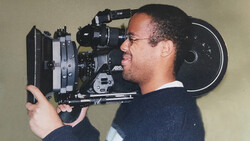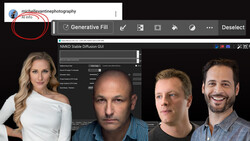

It’s been almost 3 years since I moved to London to pursue photography as a career. I’ve learnt that there are many misconceptions about those who take photos for a living - so here I’m setting the record straight about what day-to-day life is really like for a portrait photographer in one of the world’s biggest cities.
Moving to the city
“I’m doing it. I’m moving to London.”
A friend of mine living in South-West London had just told me a room in his house was going to be vacant from the end of the month. That was all the convincing I needed – I was at breaking point feeling like life was passing me by as I was stuck back home in the Isle of Man. Mum wasn’t as sold that the timing was right.
I’d been working solidly, seven days a week for the best part of six months since finishing University. I was working two retail jobs, with only the thought that they were temporary, getting me through each day. I couldn’t accept working 9-5 for the rest of my days, least of all because it left me with no time to shoot. I handed in my notice at both jobs the day after learning about the free room, and I moved to London two weeks later.
I’d always felt excitement upon arriving in London as a tourist, and moving there was no different. For the first two weeks I did nothing but take the train into Central and explore the city. I couldn’t believe I was finally living in the place I’d thought about every day, after wanting to make the transition for so long. But soon, reality set in and I knew that it was time to start making a living from taking photos. I knew the types of projects I wanted to be working on – portraits, for musicians, actors and models – but I wasn’t sure quite what the pathway leading to that point was going to be shaped like.
Reflecting on past achievements... and moving forward
I sat down at my laptop. I was entirely freelance… Which also translates as being entirely alone. Not only metaphorically, but also in a literal sense, since all my housemates were at their respective salary jobs during the day. I only had a handful of friends in London, with even less contacts and zero knowledge of the industry. Being self-taught, and having studied English Language at University, I had to survive knowing only the things I’d learnt through experimenting with my camera.
I thought about the success I’d had thus far; two months previously, in September 2012, I’d shot press shots for musician Charlotte Church, which lead the campaign for her then-new album. That was easily the biggest client I’d worked for, and it had stemmed as a result of making contact with Church via Twitter. My fascination with messaging potential clients via Twitter started when looking for distractions whilst writing my dissertation. At this point, I was aiming to approach management companies that looked after several artists, offering to shoot numerous of their acts for one large, overall reduced rate. It occurred to me that a lot of these companies had Twitter, and that their account on the social network interacted with lots of similar businesses. I began exploring each company’s followers, finding endless management and PR contacts to get in touch with. It continued to snowball as Twitter recommended more and more similar accounts. One day, I stumbled across a production company that specialised in live, acoustic music sessions. It didn’t feel quite like what I was looking for, but I copied and pasted the same email to them anyway. Soon enough, the owner replied. We got together for a meeting, ended up working together on a few small projects, and it turned out the same guy also worked at one of the largest radio stations in the country. A few months later I was shooting for the radio station too, and photographing A-List names. I was learning quickly just how small the creative industry in London is, and how accurate that old phrase is: it’s all about who you know.
For the most part, I’ve given up contacting people on Twitter, and now tend to stick to emails for all things business. Emails have become the centre point of my entire existence. I live by them. My email tab never closes. I’ll aimlessly refresh the email app when out in public. Which is just as well because quite often, work offers come through incredibly last minute. There’s no time too late at night for an email to appear in my inbox. The best example I can give you occurred when I was settling down for a night of editing at 11:30pm (I’m somewhat of a night owl – but we’ll come back to that shortly…), only to receive an email asking if I could be in Essex for a 7:30am start the very next day. That was, to be on set in eight hours time. After negotiating rates, it wasn’t until 1:30am that the client confirmed me for the job. By that point, I could only manage to clock a little less than four hours sleep before I had to make my way to the address I’d been sent.
Being your own boss
To me, there are three major factors that define being freelance.
1) Having absolutely no structure to your working week. I don’t currently have a studio of my own (I simply hire one on the occasion that a client requests one) and as a result, I work from home on the days that I’m editing or doing email admin. Naturally, if you have no office to get to, nor do you have a boss watching what time you’re clocking in, it’s all too easy to fall into a rather unconventional sleeping pattern. I find that most of my editing gets done late at night, usually any time between 10pm and 3am. Sometimes, if it’s a productive night, I’ll continue until 4 or 5am. These may seem like some crazy and unsociable hours, but I just seem to be in my prime during the small hours and find this is just when I get most of my work done. Likewise, I’m lucky in that I often get to be selective with call times for my shoots, and prefer scheduling them for mid-late afternoon. This complements my editing (sleeping!) pattern too, meaning that I can sleep until late morning. It also means I’m free to do any errands or meetings at off-peak times – much cheaper and quieter than that of someone with a ‘regular’ job. I hear horror stories of the peak-time commute for those working in the city, but it’s something I rarely have to experience.
Another noteworthy point about a freelance photographer’s routine is that whilst many industry jobs take place throughout the week, you can often find yourself working with, for example, amateur musicians who hold down a Monday-Friday job – meaning they’re only free to shoot across the weekend. As a result, I’ve essentially lost track of weekends. These days, I’ve found I work with better with dates, as weekdays and weekends tend to blend together. If you ask me what I’m doing next Monday, I’ve likely no idea. But if you ask about the 16th, or the 23rd, I’ll be a little more clued up. I designate free time for leisure simply as and when I have the chance to take it. Sometimes I’ll be relaxing throughout the day and be working through the night. It may seem unconventional, but I enjoy what I do to the extent I’m happy to work as and when I’m required to.
As for what a normal day is like for me? I’m either out shooting, at home editing and doing emails, or travelling to every corner of London for meetings or location scouting. I find it’s quite a nice balance, as I’m never stuck doing the same thing for too long.
2) You really never know where your next paycheque is coming from. In a world where you don’t have a guaranteed salary or a designated payday, you can really end up living month-to-month. I feel lucky in that I’ve managed to live comfortably thus far; but the fact of the matter is, there’s no security. There have been weeks that I’ve had 5 or 6 shoots crammed in – sometimes several on the same day – only for a quiet period to follow. Picture me refreshing my inbox, beginning to hope that maybe my email system is just down. Somebody wants to hire me, surely?! It can be incredibly testing at times, and being freelance involves mastering the skill of making your money stretch.
A positive about freelance work is that payments can be staggered more regularly than a salary job, resulting in several paydays within close proximity. It means a lump sum doesn’t drop into your bank account at one time, so there’s less temptation to spend a ton of money.
There have been many occasions that I thought it was all over. You go through a dry spell where the only job offers include the all too familiar lines of “…we currently have no budget, but…” and “Think what this will add to your portfolio!”. It’s funny where jobs sometimes come from – the friend you worked with in retail years ago… a stranger who just Googled ‘Photographer in London’ and happened to stumble across your site. Every time I’ve felt like I could really pack it all in, something always seems to come through out of the blue to see me through.
3) The next element of being freelance is my personal favourite – being entirely in control. Being freelance brings with it a whole world of freedom. The best thing about that is that you can take a step back and really think about what direction you want your career to head in. You can cater your portfolio to the type of audience you want to attract (mine is aimed at musicians, actors and models – although I have PDFs for corporate clients and those seeking ecommerce work).
I did try having an agent for a short while, but it didn’t work for me. I’ll be the first to admit I’m a complete control freak and, although my agent could prove her industry experience, I didn’t feel comfortable letting someone else speak to potential clients on my behalf. We parted ways amicably and since then I’ve been embracing the freedom again. This leads me on to my next point.
When you’re working as a one-man (or woman!) team, it’s worth remembering that nobody is going to help you out except you. You are responsible for marketing yourself and bringing new clients in. Facebook, Twitter, Instagram etc are all great ways in which you can do just that; you’d be surprised how many business enquiries you can get through social media. They are all free tools that you can use to showcase your work and use to get your audience and clients invested in you as a person and as a brand. Like I said, you really never know where your next paycheque is coming from.
Experience doesn't pay the bills
Arguably the most important factor in making things work as a freelancer is learning the value of your work. The creative industry seems to be plagued by the belief that promises of future work can be accepted as currency. The last time I checked, my landlord didn’t accept promises or experience as a form of rent.
Working for free is an essential part of being a creative; often, clients don’t ask for proof of a degree or a qualification, but merely a portfolio of work relevant to their requirements. It’s inevitable that you’ll spend the first few years working largely for free. Try to remember that you do actually enjoy what you do, and that free work can be enjoyable. Continue building your portfolio until there comes a point where you find that you’re asking yourself, honestly: is working on this particular shoot – putting the time, effort and stress in – actually going to enhance my portfolio? Is there something about this project I’ve been proposed with a zero budget that is really going to increase my marketability to future paying clients? When the answer becomes no more occasions than not, it’s time to head back to the drawing board. Devote some serious energy to crafting your portfolio into the best representation of what you do as possible. Your portfolio speaks on behalf of you, your work and everything you’re about. Be firm with yourself and make sure only your best work makes the cut.
Decide on a set of rates. So many projects can vary in requirements that it can be hard to land on set figures, but try and set out a guideline for yourself. Once you’ve decided these, live by them. Be prepared to lose some jobs at the hands of the threat of “Well, if you won’t do it for free, I’ll just find someone else who will”. Keep at it and I guarantee before long you’ll get so much more from sticking to your guns than being taken advantage of. To feel that your work is actually worth something, and that somebody couldn’t afford your skills will fill you up with a whole new sense of self-worth. And let’s not forget, there are good people out there who are happy to pay for their photos knowing that a good job is going to be done of it. What does it say about your work if complete strangers have you working for absolutely nothing in return?
It's totally worth it!
There’s a lot to be said for being a freelance Photographer. It can be scary. It’s totally unpredictable. You’re fighting for your place in an industry where everyone tries their hand at the camera, and one where some people think camera phones are suitable - but that’s a whole different argument!. Being freelance can leave you panicking in the middle of a Tuesday afternoon feeling like you should be in an office somewhere, doing a ‘real job’. But it’s also the best decision I feel I’ve ever made. I feel incredibly lucky that I get to pursue my passion as a career. It has its moments, sure. I’d be lying if I said there weren’t quiet periods or times I felt as though I’ll never work again.
The bottom line is, if you’re passionate about what you do and strive to be good at it, you’ll always come out on top. Being freelance means the power is all yours.










35 Comments
I think you should add, that it's also a good idea to find as many good looking young ladies to photograph and post to social media and blogs so that people take notice of your work and your new found freedom. IMO.
Did someone piss in your breakfast?
No... not that I can tell?! But something odd did strike me to write my admittedly "troll comment".
Probably deep inside*, the instinct that this article could've used other pictures to illustrate being a freelance photographer than the ones chosen. If only to give confidence to those that don't do portraits, can't find or are shy around pretty girls.
There's STILL a lot of freelance photography projects to be found other than portrait and good advise in this article to "go for it".
* Probably also my guilt for only voting for the assorted beauties gracing the portfolios here on FS?!
I do agree with your thought on this. Good looks, get views, those views can translate over to you if you photograph them.
Hi Doc Pixel,
With due respect I'm failing to see your issue with a Photographer taking portraits of people that inspire him and posting them online..
I have absolutely nothing against the photographer, his style nor his preferred subject. Please see my post to Tam above rather than repeating myself.
"Networking" was mentioned in Twitter and email contacts. Another way to network would be to join a local camera club. The camera club that I'm a member of has several professional photographers as members; generally, the monthly presentations at the club meetings are given by a professional photographer, mostly from outside, but sometimes from club members. It's a great way to meet other photographers and pick up tips.
Hey Ralph,
A camera club is something I've never actually tried! The curse of the digital era perhaps...
I actually studied English Language at University, so I perhaps missed what would have been a great chance to meet and talk with other aspiring photographers. I feel like meeting in person is likely to be more beneficial than just posting work on photo sites like Flickr and 500px, where photos can be washed away in an endless stream of pictures. Glad you found something that really works for you!
Cheers,
Jack
Thanks Jack for this article.i am a freelance photographer based in Mumbai India, and i can relate to all the things you mentioned. being a one man show can be very taxing especially in the photo industry but its fun too. :)
Hey from London!
I did try having an agent once, but I'm a complete control freak and much prefer being a one man show as you called it! The positives definitely outweigh the negatives though. I'm always motivated by the knowledge that nobody else is going to do my work for me!
My idea of freelance became much more serious than yours once I married and had children. It's important to understand the principals of business, as with any career choice (plumber, electrician, politician...), to be a successful freelance. Nonetheless, congrats on your venture!
Oh, I don't doubt! At the moment I only have to look after myself. I'm sure it's a very different ballgame when you're responsible for a family, too. Glad you enjoyed the article!
Did you remain freelance after starting a family? Congratulations, if so!
Indeed. Thanks!
Thanks for the post, good to get a reminder that "nobody is going to help you out except you" once and a while... wishing you all the best in your journey.
Thanks Andrew! It's soo true... definitely something we freelancers need to remember. I think a lot of it can be down to luck, and being in the right place at the right time, but you certainly create your own luck...
Jack, i loved your portfolio, it looks great. I am a Chilean wedding and portrait photographer. I was in London few months ago and i was amazed by that city. i´m really happy for you that you are pursuing your dream..... as i am pursuing mine here ;) .... i worked for 7 years in a concrete company (im also an engineer) but i choose the photography world which is really my passion, so i quit my job a few months ago. I created my own photography company (www.rog-art.com) and trying to get a "name" in the wedding and commercial industry. I´m in the same page as you, so your article was very fun to read.
Cheers and good luck !!
Pablo
Thank you! That's amazing. How are you finding the change? Are you glad you did it? I think a lot of people get comfortable in their jobs or careers and are understandably afraid to change, especially if it means going freelance. Sincerely hope it works out for you!
Enjoyed the article, came back to comment and add to the discussion and noticed that some other comments had been deleted? I'm not sure how much censoring speech (especially when it is not hate or combative) does to add to the credibility of an free and open community of debate?
Hey Michael, glad you liked it! I did remove the comments of one user, who insisted that I can't possibly be freelance because of my age, stating that I needed 5-10 years of experience. Generally speaking, I welcome debate and criticism as long as it's constructive, but I found those particular comments distasteful.
So as a freelancer, how does one find clients to market your work too?
I've found that the London creative community is really small. I send quite a lot of emails to management and PR companies, music magazines etc. Once someone takes a chance on you, you soon meet lots of people. On any given set there's a make up artist, stylist, hair artist, the talent, management, contacts from the magazines, a point of contact member of staff for the venue... all of whom have their own set of contacts. I find once you get the ball rolling, word of mouth helps spread the word and it happens quite naturally! Not always, though.
“I’m doing it. I’m moving to London.”...this first sentence aplies to me “I’m doing it. I’m moving to Lisbon.”, i am in the exact same position as you were one day, i know no one and i don't know where to start from. I do have a great friend here though, who's willing to work with me doing the same kind of photography that you do. Here in Portugal people are somehow learning to apreciate good photography and so, i have faith i can make it around here.
It's funny how it all starts... I don't know about Lisbon, but in London everyone seems to know each other. Once you meet someone, you end up meeting all their friends/contacts too. It's fun making progress though. Good luck!
Indeed being an Independent/Freelance has its own advantage and disadvantage.
Being one of them and base in Asian Region sometimes can be quite challenging.
Especially competing with big production house who have all the talent/crew for the project. For sure they'll definitely choose the common one but so far I manage to land a few commercial/ads job.
It's true in London too, large companies stick with who they know. Quite often the only contact email address you can find is a generic one too, like 'info@...' or 'enquiries@...', and you just know nobody is going to pick that message up.
Hi Jack,
Just wanted to let you know how helpful this was, I've recently quit uni to become a full time freelancer in Northern Ireland and I am absolutely terrified! This article came about at just the right time so thank you!
Hannah F x
Thanks Hannah! Good to know I didn't write a bunch of rubbish - ha!
All the experience you'll gain from getting out there and working will be invaluable. Fingers crossed for you! x
I'm retiring from the Air Force in less than 6 months and find your article very refreshing! I can't wait for the hard work, long hours and struggles! I'll have a pension that'll pay the bills and fill the fridge, but I don't think I could live with myself if I sold myself short and took a cush Department of Defense job and worked to live for vacation 2 weeks a year! There's definitely more to life than that!!! Good Luck in London!!!
Thanks Todd!
Fantastic article Jack! You're such an inspiration! =D
Thanks a lot Delissa, glad it was helpful :)
Working for free maybe a good decision for sometime but not for a long time. It should be treated as a sample only to showcase your skills and have your prospective client have an idea of what you are worth. Working free of course is an individual decision but should not be continued for long.
It took me almost seven years to get around to it, but I'm finally starting to work towards a professional freelance career. Working 8:30 to 5 in one single chair is so draining on my soul and even my relatively limited glimpses into freelance portrait photography has given me an appreciation for just how different a lifestyle it can be. While I've done a moderate number of commissioned jobs over the years, I only now feel ready to finally do it and change my life, no matter how difficult it will be. Good to hear these points from someone who is doing it.
It took me almost seven years to get around to it, but I'm finally starting to work towards a professional freelance career. Working 8:30 to 5 in one single chair is so draining on my soul and even my relatively limited glimpses into freelance portrait photography has given me an appreciation for just how different a lifestyle it can be. While I've done a moderate number of commissioned jobs over the years, I only now feel ready to finally do it and change my life, no matter how difficult it will be. Good to hear these points from someone who is doing it.
Love hearing this. Hope the article helped in some way! I'm still freelance and loving it! Best of luck.